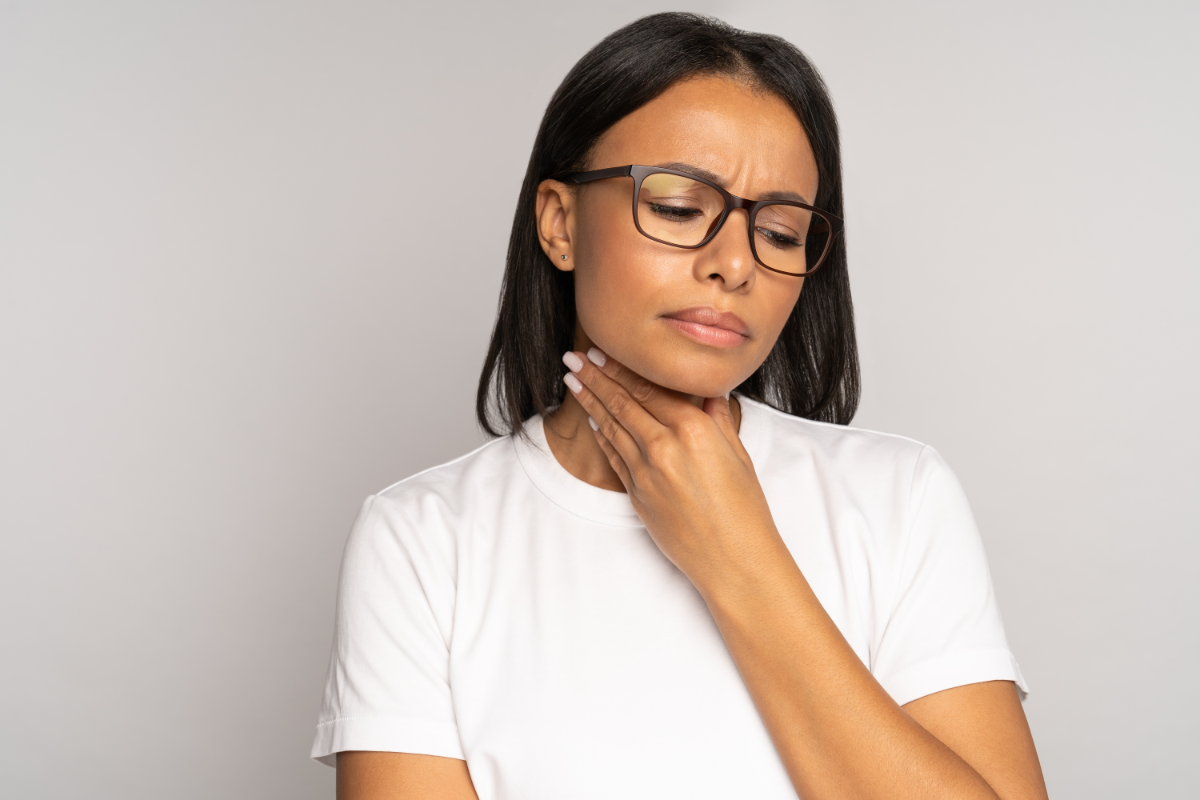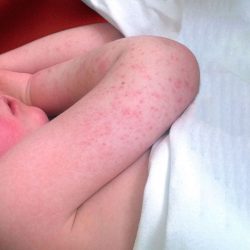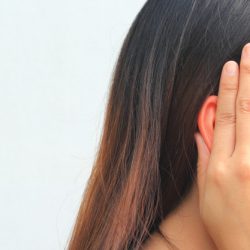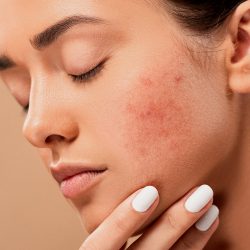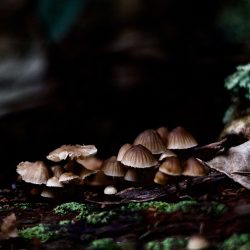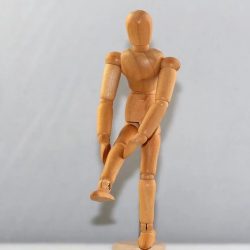Sore throat manifests itself as a sore throat when swallowing, with a burning or tingling sensation. The cause is often infectious (angina, rhinopharyngitis), but throat irritation can also be caused by excessively dry air, inhalation of tobacco smoke dust, incorrect use of the voice or the passage of an unusual object (fish bone, for example). Angina is primarily a microbial infection of the tonsils and/or oropharynx caused essentially by a micro-organism (virus or bacteria). Most cases of angina are caused by a virus. In around 25% of cases, however, angina is caused by bacteria (group A beta-haemolytic streptococcus), warranting the prescription of antibiotics.
What are the symptoms of strep throat? What is the difference between viral and bacterial angina?
|
|
Strep throat |
Viral angina 50 to 90% of cases |
Epidemiology |
Winter, spring. Peak incidence between the ages of 5 and 15. Never after age 25, almost never before age 3 |
All year round |
Angina test= rapid diagnostic test |
The angina test determines the bacterial origin of your sore throat by swabbing your tonsils. It reveals the presence of beta-haemolytic streptococcus. If the cause is bacterial, antibiotic therapy is essential. Since 1999, experts at an official conference (a consensus conference) have decided that only potentially dangerous cases of strep throat, i.e. those caused by beta-haemolytic streptococcus A, should be treated with an antibiotic, especially if the person affected is under 25.
|
Exacto® Streptatest…
|
General signs |
Sudden onset
|
Progressive onset
|
Local signs |
Intense pharyngeal erythema, exudates
|
Vesicles
|
Complications of poorly treated sore throat |
Scarlet fever
|
No complications, spontaneous recovery in 3 to 4 days |
Treatment of strep throat |
Antibiotics
|
Analgesics
|
Mac Isaac score
This 4-item score (fever >38°C, presence of exudates, cervical adenopathy, absence of cough, age) is used to assess the risk of strep A angina.
Other angina
In addition to red (erythematous) and white (erythematopultaceous) angina, there are other rarer forms of angina: vesicular (with ulceration), pseudomembranous or false-membranous, ulcerative and ulcero-necrotic. However, their diagnosis requires additional laboratory tests, depending on the suspicion of the case.
- Some are bacterial: Vincent’s angina (ulcerative), syphilitic angina (indurated ulceration), gonococcal angina (red with more or less exudate), diphtheria angina (with false membranes). These types of sore throat also require targeted antibiotic treatment, depending on the diagnosis.
- Others are viral: infectious mononucleosis (non-adherent false membranes), herpes simplex (vesicular), etc
What is hoarseness?
Hoarseness is an alteration in the timbre of the voice. It is in fact a disorder of the vocal cords, which no longer vibrate normally. The voice becomes lower, hoarse and sometimes almost inaudible, a condition also known as “voice extinction”. Hoarseness can also be accompanied by a cough or sore throat.
Causes of hoarseness
There are many causes of hoarseness: laryngitis, an overly dry or smoky atmosphere, benign nodules on the vocal cords caused by excessive strain.
What is pharyngitis?
Pharyngitis is an inflammation of the pharynx. In children, however, rhinopharyngitis is more common, i.e. inflammation of the nasopharynx. Rhinopharyngitis is ultimately viral in origin, caused by rhinoviruses.
Preventing strep throat. How can strep throat be prevented?
Angina is transmitted mainly through oral contact and saliva splashes. So to prevent the transmission of angina :
- Use tissues
- Put your hand in front of your mouth when coughing
- Wash your hands frequently
- The sick person is no longer contagious 24 to 48 hours after the start of treatment
Advice on sore throats
HYDRATE
- Use a humidifier (aroma fountain) or water containers placed against radiators to soothe throat irritation and moderate coughing.
- However, drying out the pharyngeal mucosa increases the burning sensation, so it’s advisable to drink plenty of water. Choose hot drinks with honey (lemon honey, for example). Drinking helps dilute the viruses and therefore reduces the risk of coughing.
- Eat mainly liquid foods to reduce the pain of swallowing.
- Suck on lozenges for sore throats. The hyper salivation caused by sucking contributes to healing (Activox, Drill, Lysopaïne, Oropolis, Strepsils, Valda, etc.)
- Also cleanse the nose with saline solution (Cooper® nasal spray)
PROTECT
- Avoid eating foods that are too acidic (lemon juice, vinegar) or too salty (crisps, salted biscuits) to avoid irritating the lining of the throat.
- Protect your neck and throat from the cold with a scarf or wrap, especially in winter.
- Avoid draughts
- Do not force your voice. Rest your voice for 2 to 3 days.
- Environment: In winter, keep the temperature in the house between 18 and 20°C, and humidify the atmosphere . Air the rooms well, especially the bedroom. Use an essential oil diffuser (Fontaine d’arômes) with a blend of purifying essential oils (PRANAROM Aromaforce Spray Purifie L’air, Respir®, Respir® Spray Air pur 50ml Menthe Citron) to purify the atmosphere and clear the respiratory tract. Clean it at least once a week.
- Avoid smoking or exposure to second-hand smoke, as tobacco smoke irritates the sinuses and respiratory tract: see our advice card: Smoking. Tobacco promotes coughing, particularly the notorious smoker’s cough (or COPD).
- Avoid alcohol and spicy foods as they are irritants. They increase pain in the throat.
Advice on hoarseness and voice loss
Avoid talking.
Vocal rest is essential. Do not force your voice or even whisper
The same hygiene and dietary rules apply to sore throat as to hoarseness.
Moisturise the pharyngeal mucosa: The main clinical signs of poor hydration of the mucous membranes of the ENT tract are vocal fatigue, dysphonia, asthmatic coughing, sternal burning and, finally, hyperkinesia or even laryngeal spasm. However, the mucus lubricating the vocal tract has an antiseptic, decongestant and anti-oedema effect, and therefore facilitates drainage of the respiratory tract.
Suck on Gelovox pastilles with hyaluronic acid to keep the pharyngeal mucosa moist.
How is strep throat treated?
The treatment of angina is inextricably linked to the rules of hygiene and diet.
The treatment will differ depending on whether the sore throat is viral or bacterial.
- If viral angina is suspected, the ANSM recommends only symptomatic antipyretic and analgesic treatment (local treatment and anti-oedematous agents).
- In children aged between 5 and 15, group A haemolytic streptococcal bacterial angina is the more likely diagnosis. (with antibiotic treatment)
BASIC TREATMENT
Local treatment
MouthwashHexaspray®, Collu-hextril®, Drill® Sore throat Mouthwash, Colludol®1 spray 6/day.
- Sucking lozenges to soothe and disinfect the throat based on lysosyme, biclotymol, local anaesthetic and enoxolone: Drill®, Strepsils®, Solutricine®, Hexalyse®, Lysopaïne® Sucking tablets.
- (Strefen®) from 12 years of age, contraindicated in pregnant women and in cases of gastro-duodenal ulcer.
- Natural lozenges: mucilage-based, soothing the mucous membranes of the mouth and throat
Gelovox®, Voxlysopain®…
Advice
Avoid using an oral or pharyngeal anaesthetic (lidocaine, teracaine, etc.) just before meals or drinks, to avoid false routes. An antiseptic (mouthwash or lozenges) should not be used for more than 5 days (risk of imbalance in the normal microbial flora of the oral cavity).
If you are diabetic, sugar-free lozenges are preferable (Drill® sugar-free, Lysopaïne® Sucking Tablets, Oropolis® , Strepsil® sugar-free, etc.).
Antiseptics
Bismuth salts provide effective disinfection of the ENT area (Biquinol® Suppositories, Pholcone® Bismuth).bismuth salts are selectively eliminated by the salivary glands via the lymphatic system .Contraindications: Allergy to one of the constituents. Contraindicated before the age of 6.
Precautions for use: do not use bismuth for more than 3 consecutive days without medical advice.
Anti-oedematous
Syrups or tablets containing an enzyme (alpha-amylase) to reduce oedema and inflammation: Megamylase®, Maxilase®
Analgesics and antipyretics
Paracetamol preferred (Dolipraneoro®)
Anti-inflammatories: Ibuprofen
Advil®, Advilcaps®, ADVILEFF®, Gelufen®, Spedifen® Nurofenflash®, Nurofen®, Nureflex®, Nureflex®
Anti-inflammatories are contraindicated during pregnancy and in asthmatic patients.
Antibiotic therapy
If strep throat is suspected (from the age of 5 if severe pain is present, following a rapid RDT test), short-term corticosteroid therapy combined with antibiotic treatment may be considered.
The antibiotics recommended by ANSM are first-line: Amoxicillin for 6 days, taken with or without meals. In the event of allergy to penicillins, 2nd and 3rd generation cephalosporins may be used. In cases of allergy to beta-lactam antibiotics, a macrolide or related agent is indicated. With the emergence of macrolide-resistant strains of streptococcus A, a throat swab with culture and antibiotic susceptibility test is required to check the sensitivity of the streptococcus to the chosen drug.
If antibiotics are prescribed, combine with a yeast to prevent diarrhoea
To prevent recurrence
Take a course of Vitamin C, Activox® Liquid Heart Echinacea chewable lozenges (3/day)
Honey
Use honey to sweeten your coffee, for example. Your pharmacy can supply you with special honeys (thyme honey, rosemary honey, etc.).
Royal jelly
A revitalising nutrient concentrate that helps stimulate the body’s natural defences. It also has a high nutritional value (essential amino acids, trace elements, B vitamins). Royal jelly nourishes the larvae for the first 3 days of their life, as well as the queen throughout her life. For prevention, a course of 0.5g/day for 40 days is recommended. It can also be taken as a cure at a dose of 1g/day to stop an infection in progress.
3 Chênes Royal Jelly, Arko Royal, Dayang® Royal Jelly, Dayang® Ginseng Royal Jelly, Cooper® Royal Jelly, Inovya® Royal Jelly, Vitaflor Bio Royal Jelly..
Propolis
Propolis® , Oropolis®, Propolis mother tincture, Propolis spray, Propolis syrups…
To find out more, see our advice sheet: Propolis
Angina and oligotherapy
Oligosol®Copper: 2 ampoules/day for 3 days to treat the infectious condition.
-
Oligosol® Bismuth(anti-infectious, anti-inflammatory and stimulates natural defences) for 5 to 10 days. For children aged 6 and over.
To prevent recurrences
Oligosol® Mn-Cu (manganese copper) combined with Oligosol® Cu-Au-Ag (copper, gold, silver).
What vitamins or food supplements should I take for sore throats?
Vitamin C
Prefer natural vitamin C such as acerola
Vitamins C and acerola: 3 organic oaks Acerola 500, 3 organic oaks Acerola 1000, Acerola 1000 Arkopharma®, Acerola Arkogélules®, Vitascorbol® 500, Vitascorbol® 1g
In all cases
Propolis: 1 capsule 3 times a day, until symptoms disappear
Before taking this treatment, consult our advice card: Propolis
To avoid recurrences
Take a course of food supplements specially designed to boost your natural immune defences:
- Bion® 3, minerals and probiotics to help strengthen the body’s natural defences
- Alvityl® défenses combines vitamin C, propolis and 2 strains of Echinacea (immunostimulant plants)
- Immunodéfenses Inoya® combines vitamins, minerals, echinaceae and probiotics (saccharomycès cerevisiae) ..
- Activox® Echinacea liquid heart lozenges (3/day)
- Grapefruit seed extract, nicknamed a natural antibiotic, has stimulating and protective properties for the body, due to its richness in bioflavonoids and vitamin C with anti-oxidant properties.
Grapefruit seed extract has antibacterial, antiviral, antiparasitic and antifungal properties. It is thought to act against 800 strains of bacteria and viruses and 100 strains of fungi (moulds), while preserving the intestinal flora. Grapefruit seed extract can therefore be described as a “natural antibiotic with a broad spectrum of action”.
Grapefruit seed extract is traditionally used in cases of gastrointestinal dysfunction and ENT problems.
ARKOFLUIDES® Grapefruit Seed, Nutrisanté® Grapefruit Seed Extract…
Homeopathic treatment for sore throat
Gargle
Gargle 3 times a day with the following mixture: Calendula TM Phytolcacca TM in equal parts. 1/2 teaspoon per glass of hot water.
The Calendula mother tincture has soothing, antiseptic and anti-inflammatory properties (due to the saponosides and carotenoids contained in Calendula flowers). It can be used to relieve irritation and itching. The mucilaginous substances (pectin and rubber) have moisturising and soothing properties
To find out more, see our Calendula tip sheet
Warning: due to the presence of alcohol in mother tinctures, not recommended for children or pregnant women.
In all cases:
Homeogen 9 or Angipax®: Suck 1 to 2 tablets every hour (from age 6)
Precaution with all these medicines: Due to the presence of the PULSATILLA strain in the formula, this medicine should not be used in cases of otitis or sinusitis without medical advice
Depending on the symptoms :
Suck 3 granules 3 times a day of one or more of the following strains, until symptoms improve
- Sudden onset of symptoms, particularly at night, after a cold spell. Throat is dry and burning: thirst difficult to swallow => Aconit 5CH
- Throat red and congested. No thirst, burning pain reduced by taking cold liquids => Apis 5CH
- Painful swallowing, abundant yellow nasal mucus, sometimes bloody. Thirst, cervical adenopathy => Mercurius solubilis 4CH, 5 or 7 CH
- Painful swallowing with radiations to the ears and neck, general aches => Phytolacca 9CH 5 granules 3 to 4 times a day
- Sudden onset, hardly any thirst with high fever (close to 40°), profuse sweating, dejection. Face congested, pupils dilated, tonsils shiny, scarlet and painful, tongue raspberry red. Pain aggravated by swallowing liquids=> Belladona 9CH 5 granules 3 to 4 times a day.
- Burning pain like that caused by pepper: Capsicum 5CH
- Very sensitive throat (sensation of having swallowed a bite askew) with greenish expectoration. Irritable, short-tempered and cold. Pale complexion, possibly slight oedema of the upper lip creating a “tapir’s snout”:=> Hepar sulfur 9CH
- Pain begins on the left or moves to the right as far as the ear. Impression of a foreign body at the back of the throat. Cannot swallow anything, especially hot liquids => Lachesis 5CH
- Pain starts on the right or moves to the left. Warm liquids improve, cold liquids aggravate. Pain worse in late afternoon, early evening => Lycopodium 9CH 5 granules once a day
- Bad breath, abundant, yellow, viscous saliva. Thirst, perspiration. Dry throat and swollen tongue => Mercurius corrosivus 5CH if red angina => Mercurius cyanatus 5CH if white angina
- Throat dark red or bluish. The more you swallow, the more it hurts =>Phytolacca5CH
- If there is a threat of associated otitis: Ferrum phosphoricum 4CH
Angina on the right
Mercurius proto iodatus
Lycopodium ( improves when drunk warm)
Phytolacca (improves when drunk cold)
Angina on the left
Mercurius bi iodatus
Lachesis (improved by cold drinks and the onset of menstruation)
Lac caninumsi if the pain changes sides
Constitutional treatment
Recurrent angina, alternating with aphthosis or recurrent gingivitis, are characteristic signs of luesis.
This diathesis therefore needs to be treated to prevent recurrence
Also look for the specific signs of lutistic drugs: Luesinum, all mercurials, all kali, heavy metals such as Argentum nitricum, Aurum metallicum, Baryta carbonica, Platina, Calcarea fluorica, Fluoricum acidum, Iodum, Lachesis, Plumbum, Borax, etc.
1 dose of each strain to be selected on a weekly alternating basis. The dosage ranges from 9 to 15 CH if there are many similarities.
Homeopathic treatment of hoarseness
Local treatment
Gargle 3 times a day with the following mixture: Calendula TM Phytolcacca TM in equal parts. Caution: due to the presence of alcohol in mother tinctures, not recommended for children or pregnant women.
General medicines
Arum triphyllum composé 3 granules 3/day; Homéovox® or Voxpax®: 1 tablet to be sucked every hour
Sambuscus 5 to 10 lozenges a day to be sucked.
Specific products
Linked to cold or abuse of the vocal cords, changing tone (bitonal voice), dry cough => Arum tripholiens
After straining the vocal cords, sensation of having a scratchy throat => Arnica montana
Linked to cold with a hoarse cough => Aconitus
Calmed by a sip of cold water: Cuprum metallicum
If the cough tends to become chronic
Phosphorus for burning pain in tuberculosis patients. Tracheobronchitis not preceded by a cold or nasopharyngitis. Aggravation at dusk. Need to drink large quantities of cold water.
Hepar sulfuris calcareum: in psoric individuals. Tracheal pain, strong sensation of a wound, splinter, burn with greenish expectoration. Irritable, hot-tempered and cold. Pale complexion, possibly slight oedema of the upper lip giving the appearance of a “tapir’s snout”. Cough is also painful. Intolerant of the slightest cold or draught. Protects its mouth with a scarf
Causticum for hoarse voice. Hoarseness and cough in the morning. Broken voice. Sometimes urinary incontinence with coughing.
Herbal treatments for sore throats
Local treatment with a soothing, anti-inflammatory, antiseptic and mucosa-protecting effect, in the form of lozenges to be sucked, dabbed on and gargled.
Emollient and softening plants:
Mucilage plants are emollient and softening. They should be taken in liquid form to benefit from their softening action:
- Marshmallow (Althaea officinalis: roots, flowers and leaves in decoction),
- Mallow (flowers and leaves in infusion),
- White broth (decoction of blanched flowers),
- Plantain (Plantago minor) plantain leaves are astringent thanks to their tannin. At the same time, its mucilage has a soothing effect. It is useful in cases of diarrhoea, angina, inflammation of the oral mucosa and respiratory tract disorders such as chronic bronchitis. Plantain is used as a prolonged infusion (at least 20 minutes) of 100g of leaves per litre of boiling water (one cup 3 to 4 times a day)
Healing plants
Calendula mother tincture : Calendula or garden marigold tincture should be used diluted in water because of its alcohol content. Calendula has soothing, antiseptic and anti-inflammatory properties (thanks to the saponosides and carotenoids contained in the Calendula flower). It can also be used to relieve irritation and itching. The mucilaginous substances (pectin and rubber) have moisturising and softening properties.
To find out more, see our Calendula leaflet
- Propolis: Oropolis®: suck on to increase effectiveness. To find out more, read our advice card: Propolis
- Liquorice can be used as a gargle and mouthwash for mouth ulcers and stomatitis. To find out more, consult our advice card: Liquorice
- Sage is an excellent healing agent. Apply a sage infusion locally. To find out more, consult our advice card: sage
Analgesic and anti-inflammatory plants
Indicated when pharyngeal pain does not respond to local treatment:
- Anti-inflammatory plants: Harpagophytum, Blackcurrant (leaf), Canada fleabane, Agrimony.
- Anti-inflammatory and antipyretic plants: Meadowsweet, Willow bark
Agrimony (Agrimonia eupatoria) is a very useful anti-inflammatory plant for angina. It is used as a decoction (gargle): Use 30 to 50g of dry plant or 50 to 80g of fresh plant and simmer for 5 to 6 minutes, to give the tannins time to diffuse further. Then turn off the heat, cover and leave to infuse for 10 minutes. After filtering, add 5 g of rosé honey. In the event of a severe sore throat, this decoction can be drunk one in three sips as part of a gargle
Plants with essential oils:
Plants with essential oils are indicated for their antiseptic action:
- Oregano,
- Scots pine
- Savory,
- Wild thyme,
- Thyme Thyme Arkogélules®: 1 capsule with 3 meals and
- Eucalyptus for its effect on the respiratory tract
Plants that treat hoarseness
Erysimum (Sisymbrium officinale)
The aerial parts of Erysimum officinale (also known as Cantor’s herb) are used to relieve hoarseness or aphonia during laryngitis and pharyngitis, and as an expectorant and mucolytic in bronchitis. This effect is due to the glucosinolates present in the plant. It is also the favourite plant of lawyers and singers..
Suggested use for an adult or teenager in case of hoarseness or risk of hoarseness in an irritated throat: Singing herb(Erysimum officinale) aerial parts Mother tincture (TM ) 50 drops three times a day in a little water
Phytolacca (Phytolacca decandra)
Gargle with half a glass of warm water: 1 teaspoon of Phytolacca decandra TM and two drops of Eucalyptus citriodora EO
Angina and gemmotherapy
Anti-inflammatory Mg
- Ribes nigrum (Blackcurrant) is useful against the primary phase of inflammation (particularly if it is of allergic origin). Blackcurrant bud stimulates the adrenal cortex, activates macrophages and consequently enables the overall maturation of the immune system in the prevention of chronic diseases. Because of its “cortisone like” action, it is preferable to take it in the morning on waking to respect the chronobiology of the adrenal gland.
- Rosa canina (Rosehip): young shoots are mainly used to treat repeated infections with localised inflammation (ear infections, nasopharyngitis, sinusitis, tracheobronchitis, etc.). The young shoots regenerate the mucous membranes which are the site of recurrent infections, and are also immunostimulant (increasing gamma globulin levels), provided they are taken over a fairly long period of time (3 to 6 months).
Dosage:
- For children, the usual dosage is 1 drop per kg of body weight per day of Bg MG 1DH (bud, 1DH glycerol macerate)
- For adults, the dosage is 50 to 100 drops per day of Bg MG 1DH (1 to 3 drops per kilo of body weight)
Therefore, take a 3-week course of treatment with a 15-day break between 2 courses. To be diluted in a large glass of water and preferably taken before meals. In the event of digestive intolerance (colic, diarrhoea, etc.), it is advisable to take this treatment in the middle of a meal
Sore throats and aromatherapy
Not recommended for children under 12 years of age, not recommended during pregnancy or while breast-feeding
Ready-to-use products
Throat spray
Respir® throat spray,Phytosun aroms® spray,Puressentiel® Respiratory Throat Spray..
Throat sprays with essential oils essentially contain organic essential oils of Thyme, Clove, Tea Tree and Peppermint known for their purifying and refreshing properties and organic extracts of Honey, Calendula, Mallow and Propolis traditionally used to soften and soothe the throat.
From the age of 6 or 7, depending on the manufacturer, spray into the throat 3 to 6 times a day.
Not for use by pregnant or breast-feeding women.
Throat syrup
Phytosun aroms drinkable solution..
These syrups are made from essential oils and plants renowned for comforting the throat and respiratory tract (mallow, pine, white broth).
Not recommended for pregnant or breast-feeding women
Capsules or capsules with essential oils for swallowing, lozenges for sucking
These complexes contain antiseptic essential oils to help clean up and optimise the respiratory system (nose) and soothe the throat.
Food supplement for adults only
Aroma Express Capsules® Respiration, Olioseptil® Bronches, Phytaroma® G.A.E, PURESSENTIEL® Respiratoire organic food supplement with 5 essential oils, PURESSENTIEL® Respiratoire Pastilles with 3 aromatic honeys..
Enrouements and aromatherapy
Olioseptil®sirop
Pharmacy advice: When should I consult a doctor?
|
Angina |
Hoarseness, loss of voice |
|
|

